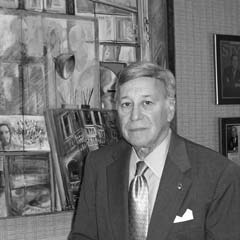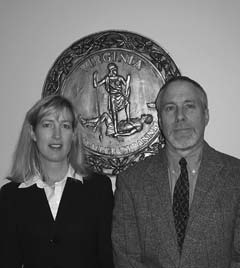04.Die.My.Love.2007 (27 page)
Read 04.Die.My.Love.2007 Online
Authors: Kathryn Casey



evin O’Keefe, here inside
,Under the Volcano, at
first believed he’d seen Piper
Rountree on that Friday eve-
ning.
arty McVey seated in the
.chair in his reception area
Kathryn Casey
where Piper sat the day Coby
Kelley followed her in the
door.
Kathryn Casey
5he Henrico County Courthouse, where the drama played out in February 2005.
Kathryn Casey




)enrico County Common-
wealth’s Attorney Wade 5o back him up, Wade Kizer brought prosecutors Owen
Kizer believed that the Jab-
Ashman (
left
) and Duncan
lin case was among the most Reid (
right
) onto the Jablin cold-blooded murders he’d case.
ever investigated.
Kathryn Casey
Kathryn Casey
*n Virginia, Murray Janus
was the dean of defense at-
torneys, his list of clients 5he trial would be Taylor Stone’s first murder case,
including some of the most and it would prove to be a trial prominent names in the state.
by fire.
Kathryn Casey
Kathryn Casey
DIE, MY LOVE / 193
“I don’t know,” Piper said.
“. . . Can you tell me what makes you uncomfortable so I can work on it, ma’am?”
“I’m just fully exhausted . . . I need to find out, to fi gure out how to get my kids, custody of the kids in Virginia.”
In the end they agreed to meet at McVey’s office again the following morning, at nine.
In Richmond that eve ning, outside the Jepson School of Leadership, in a grassy area called “the quad,” a group of thirty or so students and faculty gathered to hold a candlelight vigil for Fred Jablin. After sunset, they stood together, in the cool eve ning, and recounted stories of their dead professor and friend. One student, a junior, had been so upset when she heard the news that a friend drove her around the campus while she cried, nearly hysterical. That night, she recounted her memories of Fred Jablin, how she’d worked with him on her project just that week. She’d wanted to do a paper on leadership and surfi ng, and rather than trying to dissuade her, Fred had been intrigued by the concept, grinning ear-to-ear, as he often did when excited about an idea.
“This reminds me of my kids,” he’d said. “They like to talk about surfi ng.”
The newspaper and television reporters were kept back from the ceremony, as the university’s spokesperson, Brian Eckert, stood with the others, holding a shimmering candle and thinking about how it was such an odd turn of events for the university. It seemed strange that something as violent as murder had touched such a civilized place.
How could it happen to a member of our faculty? he wondered.
At a meeting held earlier in the day, Eckert and others had told the students all they knew: just that Professor Jablin had been murdered and no one had yet been arrested. Many of the students cried.
194 / Kathryn Casey
That Sunday, word of Fred’s murder traveled quickly through academic circles. At the Houston airport, preparing to board a flight back to Austin after delivering a lecture, John Daly received a call from a colleague to tell him of Fred Jablin’s death. The first thought that came to him was: God knows, it couldn’t be Piper. Even she couldn’t do that to her own kids.
Yet, in Richmond few thought of any other alternative.
“We all knew somehow Piper had to be involved,” says Professor Ciulla.
At the UR ceremony, as the candles fl ickered, Professor Elizabeth Fairer and one of Fred’s Jewish students recited the Kaddish, the Jewish prayer of mourning.
“He who makes peace in His heights, may He make peace upon us and upon all Israel,” they read.
“Amen,” the others responded.
“How do I prove where I was without telling them where I really was?” Piper asked Charles after he arrived at her house in Kingwood that evening, just before 6:00 p.m. While the candlelight vigil went on in Virginia, Charles sat in Piper’s living room on the beige leather couches he’d helped her buy, discussing how she could establish where she was at the time someone murdered her ex-husband.
As Piper told it, she’d been mistaken about the weekend of the conference and had never gone to Fort Worth. Instead, she was at Tina’s, waiting to be picked up to go to a Halloween party with her sister, Jean. However, Piper said, Jean had never shown up. Instead, Jean went to a different party. About 7:00 p.m., Piper contended, she’d given up on Jean and walked down the street from Tina’s to a bar called Under the Volcano. She met a married man there, talked to him, and he walked her home at about nine-thirty.
“I think his name was Steve,” she said.
As an ex- spouse, of course, she told Charles it was only DIE, MY LOVE / 195
natural that she was considered a prime suspect in Fred’s murder. While she had nothing to worry about, since she wasn’t in Virginia, she didn’t want to tell the police about hooking up with the man called “Steve” at the “Volcano.”
As Piper talked, she contended that the Virginia court system was against her and couldn’t be trusted. She’d been there and done that, and it hadn’t ended well. She’d lost her kids, for nothing really, no real reason. If the judge determining custody heard she’d been in a bar, that she’d let a man walk her home, she might never get the children.
She asked over and over again: “How does a person prove where they were on a particular date?”
At times, as they talked, Piper nervously paced the room.
Believing in her innocence and eager to help, Charles had ideas. He knew that Piper rarely cooked. Did she buy wine or carryout? If so, perhaps someone at the store or restaurant could identify her.
“No,” Piper said. She hadn’t gone out, just back and forth to Tina’s house.
“What happened?” Charles asked Piper. “How did your ex die?”
“They said the killer used a gun and some other weapon,”
she told him. Later she mentioned that police said Fred had been murdered in the driveway. When Charles asked if the children had heard or seen anything, she said they didn’t.
“They were asleep in the house. It’s a big house.”
Looking back, Charles would say that Piper didn’t seem anxious about how the children were taking their father’s murder. In fact, she contended that when she’d talked with them that afternoon, their main concern was whether they’d be going out for Halloween.
At that moment, Piper’s primary worry was how to prove she wasn’t anywhere near Richmond, Virginia, on either Friday night or Saturday morning. As Piper explained it, she was worried because years earlier, as a prosecutor, she’d 196 / Kathryn Casey
seen police mischaracterize statements and shape testimony to frame innocent people. “It was tough to get the convic-tions overturned, even when there was evidence,” she said.
As they sipped wine, they talked.
Charles thought through the situation, advising her that to get custody she was going to have to go to Virginia, hire a lawyer, and fight for her rights.
“I’m not going to Virginia. I’m terrified of the courts there,” she said. “I’m terrified of Virginia law. I’ve been beat up by it before. They’ll say I’m an unfit mother.” Raising her glass, she added, “Just for having a glass of wine.”
As Piper talked about the children, Charles kept reminding her of the ongoing murder investigation. As he saw it, she needed to pay attention to that fi rst, to clear her path to gain custody. Once she was cleared, there’d be time to pursue getting the children.
At one point they discussed the e-mail he’d received from her on Saturday afternoon. That could be used to help prove she was home at her computer when it was sent. Appearing troubled, she mentioned, “There are things in my computer I wouldn’t want the police to see.”
Charles assumed her worries related to her use of Internet dating services, like the time she used Tina’s Match.com account and met Dean Lowry. Despite her concerns, Charles advised her not to touch or change anything on her computer. “Even if you erase it six times, the professionals can reconstruct it,” he said. “Anything you change can refl ect badly.”
When she kept circling back to custody, Charles grew impatient. He was the son of an attorney, and he understood what was at stake, even if she didn’t. “Even if you were in an alley with a bunch of men paying them twenty dollars a throw for sex, you tell the police where you were and who you were with,” he advised. “You get this murder investigation out of the way, and then worry about custody.”
